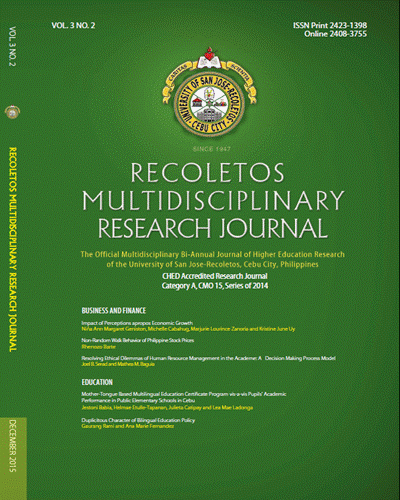Mother- Tongue Based Multilingual Education Certificate Program vis- a- vis Pupils’Academic Performance in Public Elementary Schools in Cebu
DOI:
https://doi.org/10.32871/rmrj1503.02.04Keywords:
mother-tongue based multilingual education, academic achievement, public schools, K to 12Abstract
This study investigates the effectiveness of the Mother-Tongue Based Multilingual Education (MTB-MLE) Certificate Program to the academic performance of pupils utilizing their first language in learning. Teacher-scholars’ performance were measured in terms of teaching-learning and teaching facilitation. Moreover, pupils’ satisfaction level were determined based on the comparison of teachers’ performance as scholars, trained and non-trained. The findings of this study revealed that teacher-scholars who enrolled in the certificate program showed positive and direct effect to pupils’ academic performance. An increase of pupils’ achievement and satisfaction level towards learning using MTB-MLE as a medium of instruction was grounded on the intensity of teachers’ training about the implementation of MTB-MLE in each grade level. Furthermore, scrutinizing the differences of both teachers’ performance and pupils’ performance in Grades 1-3 will be helpful in determining more provisions to make the K to 12 implementation more effective and more understandable to individuals within the cycle of learning.
References
Davis, P. M. (1991). Cognition and learning: A review of the literature with reference to ethnolinguistic minorities. Dallas, TX: Summer Institute of Linguistics. Dep Ed Order #32 S 2012: Implementing rules and regulation of the Republic Act RA No 10157 Otherwise known as the “Kindergarten Education Act†Retrieved on September 3, 2014 from http://ceap.org.ph/upload/download/201210/17141259891_1.pdf
Dep Ed Order #16 S 2012: Guidelines in the implementation of the mother- tongue based multilingual education. Retrieved on September 16, 2014 from http://deped.gov.ph/orders/do-16-s-2012
Malone, S. (2010). Planning Mother- tongue based education programs in minority language communities. Bangkok: UNESCO. Retrieved on August 17, 2014 fromhttp://www.sil.org/system/files/reapd ta/70/48/16/7048166307607336995392351528290448531/MLE_Program_Planning_manual.pdf
Malone, S. & Malone D. (2010). Two- tract approach to teaching reading and writing in pupils’ first language. Unpublished manuscript.
Martin, M. O., Mullis, I. V. S., Foy, P., Olson, J. F., Preuschoff, C., Erberber, E., Arora, A. & Galia, J. (2008). TIMSS 2007 International Mathematics Report: Findings from IEA’s trends in International Mathematics and Science Study at the Fourth and Eighth Grades. Chestnut Hill, MA: TIMSS & PIRLS International Study Center, Lynch School of Education, Boston College.Republic Act 10533: Enhanced Basic Education Act of 2013. (2013, May 15). Retrieved on September 3, 2014 from http://www.gov.ph/2013/05/15/republic-act-no-10533/
Swinney, J.M. (2008). Transfer of learning: Problem-based learning in the new millennium. Educational Journal for Teachers.
UNESCO. (2010). Summary: Reaching the marginalized. Retrieved on August 12, 2014 from Education for All Global Monitoring Report Website:http://unesdoc.unesco.org/images/0018/001865/186525E.pdf
World Bank. (2005). Education NOTES: In their own language . . . education for all. Retrieved on September 3, 2014 from http://siteresources.worldbank.org/EDUCATION/Resources/Education-Notes/EdNotes_Lang_of_Instruct.pdf
Downloads
Published
How to Cite
Issue
Section
License
Copyright of the Journal belongs to the University of San Jose-Recoletos


